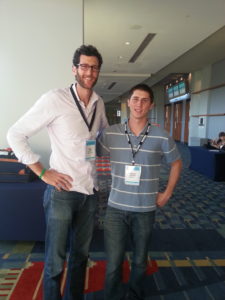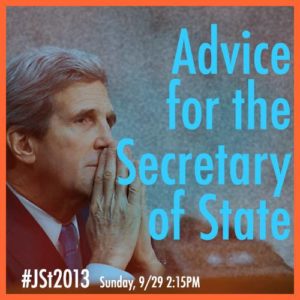 Now in its fourth year the 2013 J Street National Conference attracted around 3,000 people from all over the country. Late yesterday we sat down with two Minnesotans: Ron Garber, Chair of J Street Minnesota, and Aaron Rosenthal, Steering Committee Member of J Street Minnesota.
Now in its fourth year the 2013 J Street National Conference attracted around 3,000 people from all over the country. Late yesterday we sat down with two Minnesotans: Ron Garber, Chair of J Street Minnesota, and Aaron Rosenthal, Steering Committee Member of J Street Minnesota.
We first asked them how they felt about the conference so far. Ron said that he’s really excited, especially due to the unique situation in which this conference is taking place. He talked about how President Obama and Secretary Kerry “have come together to ask America to form a constituency for peace.”
“That’s what we’re doing in Minnesota, and here there are 3000 people that are doing the same thing. It’s inspiring, validating and exciting to get together with all those people who understand the urgency like we do and are advocating on behalf of American political involvement for a two-state solution now.”
For Aaron, this is his third national conference (out of four). “We work really hard to try to get people from MN out here,” he said. “And you don’t have to be in the room for more than 10-15 minutes to realize why.”
He said that while the whole conference is available to stream online, there’s something special about actually being here. “The energy that’s present here is not something that you can create anywhere else… You don’t understand what you’re missing out on if you just see it from home. That sense of possibility and hope and optimism that’s only created in that room, you can only get it by sitting there with everybody.”
And let’s face it, how likely are you to stream the conference from home?
Another important point the two stressed about actually being here is participating in Advocacy Day, scheduled to happen on Tuesday. Aaron said the powerful thing about Advocacy Day is that it’s J Street’s chance to urge members of Congress to be political leaders on this issue.
 To that point Ron mentioned a panel speaker from yesterday, Gadi Baltiansky, who offered some advice to Secretary Kerry. Ron paraphrasing: “In less than nine months, when the negotiations are done, he’s gonna look in the mirror and say ‘Did I do everything I could to make a deal?’” Ron continues, “That’s what we want to impress upon our elected members in Congress. We all care, we all want a deal. I want our members of Congress from the state of Minnesota to look themselves in the mirror in nine months and be able to answer that same question ‘Yes.’”
To that point Ron mentioned a panel speaker from yesterday, Gadi Baltiansky, who offered some advice to Secretary Kerry. Ron paraphrasing: “In less than nine months, when the negotiations are done, he’s gonna look in the mirror and say ‘Did I do everything I could to make a deal?’” Ron continues, “That’s what we want to impress upon our elected members in Congress. We all care, we all want a deal. I want our members of Congress from the state of Minnesota to look themselves in the mirror in nine months and be able to answer that same question ‘Yes.’”
For the two of them, and for J Street, that means a specific kind of peace—one that tends to get its fair share of controversy. But as Aaron was quick to point out, “[It’s] not some sort of radical stance, it’s a very moderate, practical stance.”
Yet it can still be a tough pill for some American Jews to swallow. Ron talked about how he came to support J Street’s view after living in Israel and coming to understand the choice that Israel, and those that support Israel have to make.
“I came to see that there are millions of Arabs also living in the land that we call Greater Israel. And they’re there. They have rights as human beings too. That means that we [Israel] have a choice to make if we want to continue to be a Jewish and a democratic state… Do we want Israel to be Jewish, do we want Israel to be democratic, or do we want Israel to reside in all the land we call Greater Israel? Because we can’t have all three.”
For that reason Ron joined J Street. He said that after returning from living in Israel, he came home and, “I didn’t hear anyone in the Jewish community here talking about [that choice].” One night he went to see Jeremy Ben-Ami, Executive Director of J Street, speak at Mount Zion. There, he said, he finally heard someone in the United States raise the questions he heard all the time in Israel. “And by the way,” Ron quotes Ben-Ami, “I choose a Jewish state and a democratic state.”
And that, it seems, is the J Street position in a nutshell—a Jewish democratic state, even if it means giving up land currently identified as “Israel.”
Some J Street supporters get accused of not loving Israel or supporting Israel. But Ron proves to be an ideal counterpoint. “I’m a dual Israel/American citizen,” Ron said. “Both of my parents fought in the Israeli army, my dad fought in the YK war. My mom was an officer in the army at the same time. I grew up in MN visiting family in Israel every other year. I moved to Israel after college. I love Israel.”
Aaron talked about his Jewish upbringing, and how the social justice of his personal politics conflicted with what he was learning about Israel. He quoted a well-known Peter Beinart article in which Beinart says,
“For several decades, the Jewish establishment has asked American Jews to check their liberalism at Zionism’s door, and now, to their horror, they are finding that many young Jews have checked their Zionism instead.”
“That was very much true for me,” Aaron said.
But when a classmate during a study abroad semester in Cape Town handed him a flyer that read “End Israel Apartheid,” he went looking for a political organization that bolstered his passion for social justice, yet fought the notion that Israel and its supporters were fueling an Apartheid State. “I don’t agree with that label in any way,” he said.
He found J Street.
For them, J Street represents both a practical response to the issue of Palestinian relations, as well as a deep emotional connection to Israel.
For Aaron, finding J Street allowed him to take the Social Justice aspect of Judaism that he found so appealing and use it to build an emotional connection to Israel.
For Ron, J Street allows him to reconcile his deep love for Israel with the sociopolitical realities that he noticed while living there.
Ron supports J Street because, “Those of us in Minnesota, and I count myself in this as well, we’re not exposed to the conflict every day, we don’t read about it every day. We often fall back on traditional notions about the parties, both sides.” But coming to the conference allows him to witness things like a member of the Palestinian ruling party, Fatah, stand on the J Street stage and say, “Hineini.”
“I’ve lived in Jerusalem, traveled in Ramallah—I’ve never heard a Palestinian stand up and say, “Hineini.” He’s a party member of Fatah, and I’d like to believe that means we have a partner for peace.”

